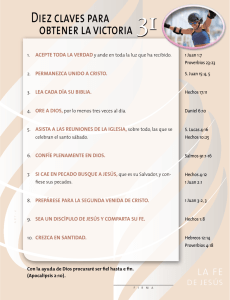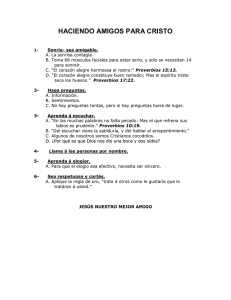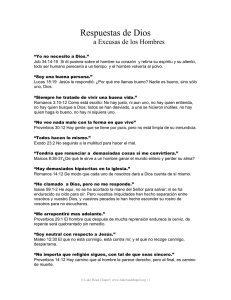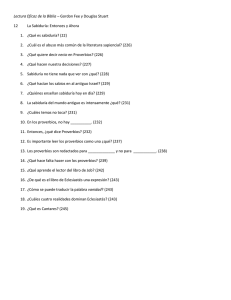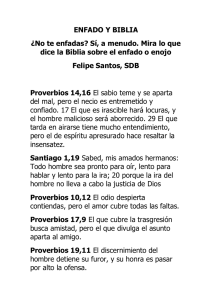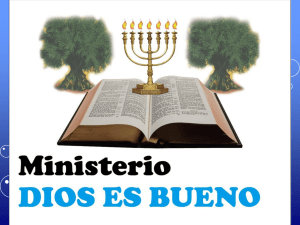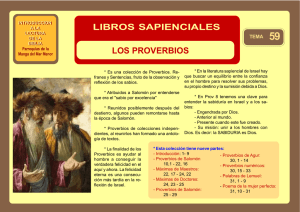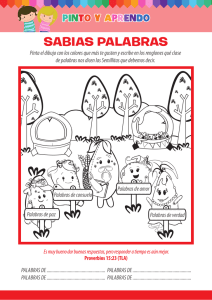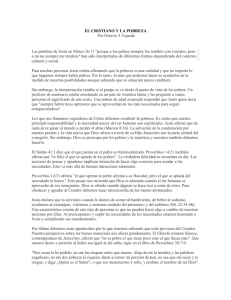CONTIENDAS/ARGUMENTS Ahora tenemos trece proverbios en
Anuncio
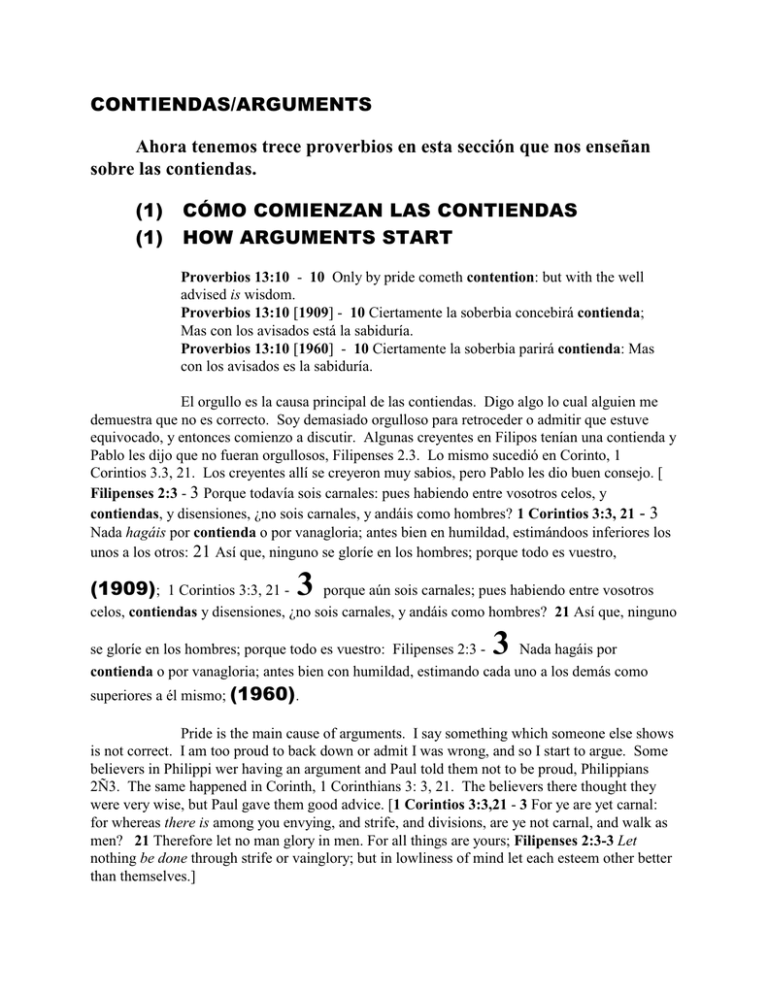
CONTIENDAS/ARGUMENTS Ahora tenemos trece proverbios en esta sección que nos enseñan sobre las contiendas. (1) (1) CÓMO COMIENZAN LAS CONTIENDAS HOW ARGUMENTS START Proverbios 13:10 - 10 Only by pride cometh contention: but with the well advised is wisdom. Proverbios 13:10 [1909] - 10 Ciertamente la soberbia concebirá contienda; Mas con los avisados está la sabiduría. Proverbios 13:10 [1960] - 10 Ciertamente la soberbia parirá contienda: Mas con los avisados es la sabiduría. El orgullo es la causa principal de las contiendas. Digo algo lo cual alguien me demuestra que no es correcto. Soy demasiado orgulloso para retroceder o admitir que estuve equivocado, y entonces comienzo a discutir. Algunas creyentes en Filipos tenían una contienda y Pablo les dijo que no fueran orgullosos, Filipenses 2.3. Lo mismo sucedió en Corinto, 1 Corintios 3.3, 21. Los creyentes allí se creyeron muy sabios, pero Pablo les dio buen consejo. [ Filipenses 2:3 - 3 Porque todavía sois carnales: pues habiendo entre vosotros celos, y contiendas, y disensiones, ¿no sois carnales, y andáis como hombres? 1 Corintios 3:3, 21 - 3 Nada hagáis por contienda o por vanagloria; antes bien en humildad, estimándoos inferiores los unos a los otros: 21 Así que, ninguno se gloríe en los hombres; porque todo es vuestro, (1909); 1 Corintios 3:3, 21 - 3 porque aún sois carnales; pues habiendo entre vosotros celos, contiendas y disensiones, ¿no sois carnales, y andáis como hombres? 21 Así que, ninguno 3 se gloríe en los hombres; porque todo es vuestro: Filipenses 2:3 Nada hagáis por contienda o por vanagloria; antes bien con humildad, estimando cada uno a los demás como superiores a él mismo; (1960). Pride is the main cause of arguments. I say something which someone else shows is not correct. I am too proud to back down or admit I was wrong, and so I start to argue. Some believers in Philippi wer having an argument and Paul told them not to be proud, Philippians 2Ñ3. The same happened in Corinth, 1 Corinthians 3: 3, 21. The believers there thought they were very wise, but Paul gave them good advice. [1 Corintios 3:3,21 - 3 For ye are yet carnal: for whereas there is among you envying, and strife, and divisions, are ye not carnal, and walk as men? 21 Therefore let no man glory in men. For all things are yours; Filipenses 2:3-3 Let nothing be done through strife or vainglory; but in lowliness of mind let each esteem other better than themselves.] Proverbios 18:6 - 6 Los labios del necio vienen con pleito; Y su boca a cuestiones llama. (1909) Proverbios 18:6 - 6 Los labios del necio traen contienda; Y su boca los azotes llama. (1960) Proverbios 18:6 - 6 A fool’s lips enter into contention, and his mouth calleth for strokes. Muchas veces los necios empiezan las contiendas con lo que dicen. Serán castigados por causar problemas, 19.29; 26.3. Proverbios 19:29 - 29 Aparejados están juicios para los escarnecedores, Y azotes para los cuerpos de los insensatos. 26:3-3 El látigo para el caballo, y el cabestro para el asno, Y la vara para la espalda del necio. (1909) Proverbios 19:29-29 Preparados están juicios para los escarnecedores, Y azotes para las espaldas de los necios. 26:3 - 3 El látigo para el caballo, el cabestro para el asno, Y la vara para la espalda del necio. (1960) Fools often start arguments by what they say. They will be punished for making trouble, 19:29; 26:3. Proverbios 19:29 - 29 Judgments are prepared for scorners, and stripes for the back of fools. 26:3-3 A whip for the horse, a bridle for the ass, and a rod for the fool’s back. Proverbios 26:21 - 21 El carbón para brasas, y la leña para el fuego: Y el hombre rencilloso para encender contienda. (1909) Proverbios 26:21 - 21 El carbón para brasas, y la leña para el fuego; Y el hombre rencilloso para encender contienda. (1960) Proverbios 26:21 - 21 As coals are to burning coals, and wood to fire; so is a contentious man to kindle strife. Alguno sólo quieren discutir y llegan a ser expertos en causar problemas. Si alguien tiene una disputa, estos pueden fomentarla. Se puede concinar sobre el fuego, pero el fuego se apagará si uno no sigue metiendo leña. La mayoría de las contiendas pronto se apagarían si algunos no siguieran fomentando problemas. Some people just want to quarrel and they become expert at starting trouble. If anyone else has a quarrel, these people can keep it going. You can cook food over a fire, but the fire will go out unless you keep adding wood. Most arguments would soon die down if people did not keep stirring up trouble. 2 Proverbios 17:19 - 19 La prevaricación ama el que ama pleito; Y el que alza su portada, quebrantamiento busca. (1909) Proverbios 17:19 - 19 El que ama la disputa, ama la transgresión; Y el que abre demasiado la puerta busca su ruina. (1960) Proverbios 17:19 - 19 He loveth transgression that loveth strife: and he that exalteth his gate seeketh destruction. Los que comienzan contiendas demustran que aman el pecado, porque Dios quiere que vivamos en paz, Hebreos 12.14. De nuevo es un asunto de orgullo porque esta persona quiere hacerse el importante. Tanto los revoltosos como los orgullosos serán castigados. [Hebreos 12:14 - 14 Seguid la paz con todos, y la santidad, sin la cual nadie verá al Señor: (1909) Hebreos 12:14 - 14 Seguid la paz con todos, y la santidad, sin la cual nadie verá al Señor. (1960)] Those who start arguments show that they love sin, because God wants us to live in peace, Hebrews 12:14. Again it is a matter of pride because this person is trying to make himself look important. Both troublemakers and proud people will be punished. [Hebreos 12:14 - 14 Follow peace with all men, and holiness, without which no man shall see the Lord:] (2) LA RAZÓN POR LA CUAL CONTINÚAN LAS CONTIENDAS (2) WHY ARGUMENTS CONTINUE Proverbios 17:14 - 14 El que comienza la pendencia es como quien suelta las aguas: Deja pues la porfía, antes que se enmarañe. (1909) Proverbios 17:14 14 El que comienza la discordia es como quien suelta las aguas; Deja, pues, la contienda, antes que se enrede. (1960) Proverbios 17:14 - 14 The beginning of strife is as when one letteth out water: therefore leave off contention, before it be meddled with. Cuando una contienda comienza, nunca se sabe hasta donde va a llegar. Es como sacar el tapón de un barril de agua, no se puede detener el agua que sale y moja todo. Una contienda sencilla puede extenderse a otros y pronto llega a ser una verdadera pelea. When an argument starts, you never know how far it will go. It is like pulling a plug out of a barrel of water, you cannot stop the water from running all over. A simple argument may spread to others and soon become a real fight. 3 Proverbios 18:19 - 19 El hermano ofendido es más tenaz que una ciudad fuerte: Y las contiendas de los hermanos son como cerrojos de alcázar. (1909) Proverbios 18:19 - 19 El hermano ofendido es más tenaz que una ciudad fuerte, Y las contiendas de los hermanos son como cerrojos de alcázar. (1960) Proverbios 18:19 - 19 A brother offended is harder to be won than a strong city: and their contentions are like the bars of a castle. Aun un hermano o amigo puede tener dificultad en perdonarle si realmente le ha herido. Una cuidad fuerte podís resistir al enemigo por much tiempo; Jerusalén resistió al ejército de Babilonia por casi año y medio, Jeremías 52.4-6. Por otro lado, un amigo o hermano le ayudará grandemente si le ha ayudado a él. Las contiendas dañan todo esto; ya comenzadas son difíciles de detener. [Jeremías 52:4-6 - 4 Aconteció por tanto a los nueve años de su reinado, en el mes décimo, a los diez días del mes, que vino Nabucodonosor rey de Babilonia, él y todo su ejército, contra Jerusalem, y contra ella asentaron campo, y de todas partes edificaron contra ella baluartes. 5 Y estuvo cercada la ciudad hasta el undécimo año del rey Sedechîas. 6 En el mes cuarto, a los nueve del mes, prevaleció el hambre en la ciudad, hasta no haber pan para el pueblo de la tierra. (1909) Jeremías 52:4-6 - 4 Aconteció, por tanto, a los nueve años de su reinado, en el mes décimo, a los diez días del mes, que vino Nabucodonosor rey de Babilonia, él y todo su ejército, contra Jerusalén, y acamparon contra ella, y de todas partes edificaron contra ella baluartes. 5 Y estuvo sitiada la ciudad hasta el undécimo año del rey Sedequías. 6 En el mes cuarto, a los nueve días del mes, prevaleció el hambre en la ciudad, hasta no haber pan para el pueblo. (1960)] Even a friend or brother may find it hard to forgive you when you have really hurt him. A strong city could keep out enemy soldiers for a long time; Jerusalem kept out the Babylonians for almost eighteen months, Jeremiah 52:4-6. On the other hand, a friend or brother will help you greatly if you have helped him. Quarrels spoil all this; once started they are hard to stop. [Jeremías 52:4-6 - 4 And it came to pass in the ninth year of his reign, in the tenth month, in the tenth day of the month, that Nebuchadrezzar king of Babylon came, he and all his army, against Jerusalem, and pitched against it, and built forts against it round about. 5 So the city was besieged unto the eleventh year of king Zedekiah. 6 And in the fourth month, in the ninth day of the month, the famine was sore in the city, so that there was no bread for the people of the land.] 4 Proverbios 16:6 - 6 Con misericordia y verdad se corrige el pecado: Y con el temor de Jehová se apartan del mal los hombres. (1909) Proverbios 16:6 - 6 Con misericordia y verdad se corrige el pecado, Y con el temor de Jehová los hombres se apartan del mal. (1960) Proverbios 16:6 - 6 By mercy and truth iniquity is purged: and by the fear of the LORD men depart from evil. ¿Alguna vez ha herido a su amigo o hermano? Con toda honestidad debe acercarse a él para confesar su culpa y pedir perdón. De aquí en adelante uno será más amistoso y siempre dirá la verdad. Esto le va a mostrar que realmente está arrepentido de lo que hizo. Los que temen al Señor deben estar dispuestos para hacer esto porque Él quiere que vivamos en paz con todos, 1 Tesalonicenses 5.13. [1 Tesalonicenses 5:13 - 13 Y que los tengáis en mucha estima por amor de su obra. Tened paz los unos con los otros. (1909) 1 Tesalonicenses 5:13 - 13 y que los tengáis en mucha estima y amor por causa de su obra. Tened paz entre vosotros. (1960)] Have you hurt your friend or brother? You should honestly go and admit to him you were wrong and ask him to forgive you. From now on you will be more friendly and always tell the truth. This will show him that you are really sorry for what you have done. Those who fear the Lord should be ready to do this because He wants us to live at peace with one another, 1 Thessalonians 5:13. [1 Tesalonicenses 5:13 - 13 And to esteem them very highly in love for their work’s sake. And be at peace among yourselves.] Este proverbio habla de un creyente que peca contra otro, y debemos estar dispuestos a perdonarnos el uno al otro, Mateo 6.14. Nuestro Dios quita nuestros pecados contra Él porque Cristo pagó el castigo. [Mateo 6:14 - 14 Porque si perdonareis a los hombres sus ofensas, os perdonará también a vosotros vuestro Padre celestial. (1909) Mateo 6:14 - 14 Porque si perdonáis a los hombres sus ofensas, os perdonará también a vosotros vuestro Padre celestial; (1960)] This proverb speaks of one believer sinning against another, and we should be willing to forgive one another, Matthew 6:14. Our God puts away our sins against Him because Christ paid the penalty. [Mateo 6:14 - 14 For if ye forgive men their trespasses, your heavenly Father will also forgive you:] 5 Proverbios 25:8 - 8 No salgas a pleito presto, No sea que no sepas qué hacer al fin, Después que tu prójimo te haya dejado confuso. (1909) Proverbios 25:8 - 8 No entres apresuradamente en pleito, No sea que no sepas qué hacer al fin, Después que tu prójimo te haya avergonzado. (1960) Proverbios 25:8 - 8 Go not forth hastily to strive, lest thou know not what to do in the end thereof, when thy neighbour hath put thee to shame. Así que es sabio considerar cuidadosamente antes de ir al tribunal o entrar en una contienda con alguien. Uno cree que sabe todos los hechos, pero el otro podría comprobar que usted está equivocado. A una persona orgullosa no le gusta ser avergonzado. So it is wise to consider carefully before you go to court or entre into an argument with anyone. You think you have all the facts, but the other person may be able to prove that you are wrong. A proud person does not like to be put to shame. Proverbios 26:17 - 17 El que pasando se deja llevar de la ira en pleito ajeno, Es como el que toma al perro por las orejas. (1909) Proverbios 26:17 - 17 El que pasando se deja llevar de la ira en pleito ajeno Es como el que toma al perro por las orejas. (1960) Proverbios 26:17 - 17 He that passeth by, and meddleth with strife belonging not to him, is like one that taketh a dog by the ears. Los perros callejeros suelen ser bravos y pueden atacar a cualquiera que los toca. Uno ve a otros peleando y quiere ayudar a uno de los dos. Esto puede ser peligroso. Street dogs are often wild and may attack anyone who touches them. You may see other people quarreling and you feel you should try to help one side or the other. This may be dangerous. (3) CÓMO TERMINAR UNA CONTIENDA 6 (3) HOW TO END AN ARGUMENT Proverbios 25:9,10 - 9 Trata tu causa con tu compañero Y no descubras el secreto a otro.10 No sea que te deshonre el que lo oyere, Y tu infamia no pueda repararse. (1909) Proverbios 25:9,10 - 9 Trata tu causa con tu compañero, Y no descubras el secreto a otro, 10 No sea que te deshonre el que lo oyere, Y tu infamia no pueda repararse. (1960) Proverbios 25:9,10 - 9 Debate thy cause with thy neighbour himself; and discover not a secret to another: 10 Lest he that heareth it put thee to shame, and thine infamy turn not away. Es mejor no meter a otros en alguna contienda. Si uno tiene un problema, debe discutirlo con la persona a solas como en Mateo 5.25. No se debe informar a otros de algún asunto privado, a menos que sea realmente necesario. No querrá que otros le consideren chismoso o uno que difunde mentiras. Vea la sección A13 - CHISME [Mateo 5:25 25 Concíliate con tu adversario presto, entre tanto que estás con él en el camino; porque no acontezca que el adversario te entregue al juez, y el juez te entregue al alguacil, y seas echado en prisión. (1909) Mateo 5:25 - 25 Ponte de acuerdo con tu adversario pronto, entre tanto que estás con él en el camino, no sea que el adversario te entregue al juez, y el juez al alguacil, y seas echado en la cárcel.] (1960) It is better not to bring others into any argument. If you have a problem, you should discuss it with the person alone, as in Matthew 5:25. You should not tell others about some private matter, unless it is really necessary. You would not want people to consider you to be one who gossips or spreads lies. See section A13 GOSSIP [Mateo 5:25 - 25 Agree with thine adversary quickly, whiles thou art in the way with him; lest at any time the adversary deliver thee to the judge, and the judge deliver thee to the officer, and thou be cast into prison.] Proverbios 18:18 - 18 La suerte pone fin a los pleitos, Y desparte los fuertes. 7 (1909) Proverbios 18:18 - 18 La suerte pone fin a los pleitos, Y decide entre los poderosos. (1960) Proverbios 18:18 - 18 The lot causeth contentions to cease, and parteth between the mighty. En el Antiguo Testamento los hombres muchas veces trataron de descubrir la voluntad de Dios echando suertes, y esto resolvía el asunto, 16.33; Jonás 1.7. Hoy tenemos toda la Palabra de Dios, y personas espirituales pueden discernir la voluntad de Dios a través de la oración. [Proverbios 16:33; Jonás 1:7 - 33 La suerte se echa en el seno: Mas de Jehová es el juicio de ella. 7 Y dijeron cada uno a su compañero: Venid, y echemos suertes, para saber por quién nos ha venido este mal. Y echaron suertes, y la suerte cayó sobre Jonás. (1909) Proverbios 16:33; Jonás 1:7 - 33 La suerte se echa en el regazo; Mas de Jehová es la decisión de ella. 7 Y dijeron cada uno a su compañero: Venid y echemos suertes, para que sepamos por causa de quién nos ha venido este mal. Y echaron suertes, y la suerte cayó sobre Jonás. (1960) In the Old Testament the people often tried to learn God’s will by casting lots, and Today we have the whole Word of God, and spiritual people can know God’s will through prayer. Proverbs 16:33 - The lot is cast into the this would settle the matter, 16:33; Jonah 1:7. lap; but the whole disposing thereof is of the LORD . Jonah 1:7 - And they said every one to his fellow, Come, and let us cast lots, that we may know for whose cause this evil is upon us. So they cast lots, and the lot fell upon Jonah. Proverbios 20:3 - 3 Honra es del hombre dejarse de contienda: Mas todo 8 insensato se envolverá en ella. (1909) Proverbios 20:3 - 3 Honra es del hombre dejar la contienda; Mas todo insensato se envolverá en ella. (1960) Proverbios 20:3 - 3 It is an honour for a man to cease from strife: but every fool will be meddling. A veces uno deja de discutir, y esto puede ser un acto honorable, Mateo 5.9. Cualquier necio puede comenzar una contienda y mantenerla; requiere la gracia de Dios para detenerla. [Mateo 5:9 - 9 Bienaventurados los pacificadores: porque ellos serán llamados hijos de Dios. (1909) Mateo 5:9 - 9 Bienaventurados los pacificadores, porque ellos serán llamados hijos de Dios. (1960)] Sometimes one person will stop arguing, and this could be an honourable thing to Any fool can start a quarrel and keep it going; it takes God’s grace to stop arguing. [Mateo 5:9 - 9 do, Matthew 5:9. Blessed are the peacemakers: for they shall be called the children of God.] Proverbios 22:10 - 10 Echa fuera al escarnecedor, y saldrá la contienda, Y cesará el pleito y la afrenta. (1909) Proverbios 22:10 - 10 Echa fuera al escarnecedor, y saldrá la contienda, Y cesará el pleito y la afrenta. (1960) Proverbios 22:10 - 10 Cast out the scorner, and contention shall go out; yea, strife and reproach shall cease. Un escarnecedor es demasiado orgulloso para ceder, 21.24. Se puede solucionar una contienda rápidament si se alejan a los necios y escarnecedores. Otras cosas malas acompañan la disputa, contienda y vergüenza. Entonces cuando el escarnecedor se va queda la paz. [Proverbios 21:24 - 24 Soberbio y presuntuoso escarnecedor es el nombre Del que obra (1909) Proverbios 21:24 - 24 Escarnecedor es el nombre del soberbio y presuntuoso Que obra en la insolencia de su presunción. (1960)] con orgullosa saña. A scorner or scoffer is too proud to give in, 21:24. An argument may soon be settled if fools and scoffers are put out. Other bad things go with the argument, quarreling and shame. So peace is left, after the scoffer leaves. [Proverbios 21:24 - 24 Proud and haughty scorner is his name, who dealeth in proud wrath.] 9
